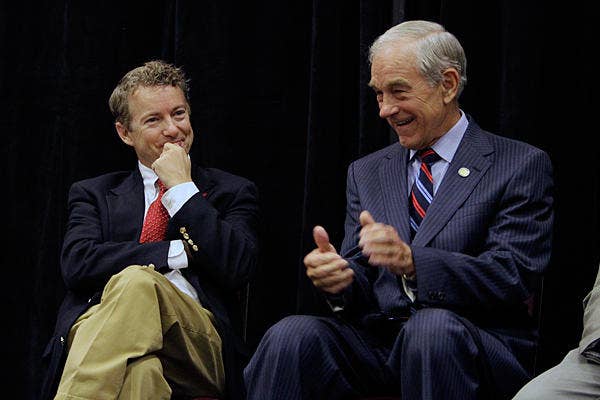
Ron and Rand Paul are set today to shift the central focus of their family's long libertarian crusade to a new cause: Internet Freedom.
Kentucky senator Rand and his father Ron Paul, who has not yet formally conceded the Republican presidential nomination, will throw their weight behind a new online manifesto set to be released today by the Paul-founded Campaign for Liberty. The new push, Paul aides say, will in some ways displace what has been their movement's long-running top priority, shutting down the Federal Reserve Bank. The move is an attempt to stake a libertarian claim to a central public issue of the next decade, and to move from the esoteric terrain of high finance to the everyday world of cable modems and Facebook.
The manifesto, obtained yesterday by BuzzFeed, is titled "The Technology Revolution" and lays out an argument — in doomsday tones —for keeping the government entirely out of regulating anything online, and for leaving the private sector to shape the new online space.
"The revolution is occurring around the world," it reads. "It is occurring in the private sector, not the public sector. It is occurring despite wrongheaded attempts by governments to micromanage markets through disastrous industrial policy. And it is driven by the Internet, the single greatest catalyst in history for individual liberty and free markets."
The manifesto quotes Austrian economist Ludwig von Mises and attacks not just the federal government, but also progressive groups that have called for similar measures to keep the Internet largely unregulated: "Today, the road to tyranny is being paved by a collectivist-Industrial complex -- a dangerous brew of wealthy, international NGO's, progressive do-gooders, corporate cronies and sympathetic political elites."
The manifesto lays out five specific battles with government regulation and with liberals who state their goal of online liberty in similar terms, but who view corporate encroachment as a more immediate risk. The Paul manifesto seeks to rein in anti-trust actions against companies in new industries; to stop attempts to impose "Net Neutrality" rules on broadband providers; to prevent government control of online infrastructure; to broaden private control of the wireless spectrum, and shore up "private property rights on the Internet."
The Pauls also take a stand for the growing industry known (and widely criticized) as "big data."
They deride the notion that "private sector data collection practices must be scrutinized and tightly regulated inthe name of 'protecting consumers,' at the same time as government’s warrantless surveillance and collection of private citizens’ Internet data has dramatically increased."
Paul's so-called "Audit the Fed" bill will soon be put to a vote in the House of Representatives, and the new campaign will kick off shortly thereafter.
"We are going to bring to this project the same kind of intensity, resources and energy we brought to the Fed Audit," said one Paul adviser.
The document is intended to serve as a conservative counterpoint to a Declaration of Internet Freedom released this week and hosted by the group FreePress, though the two share some goals. The earlier document, which sets out broad principles but does not take sides on divisive issues like Net Neutrality, was signed by groups including the American Civil Liberties Union as well as Internet companies such as Mozilla.
The language of the document tries to reclaim the issue of Internet freedom from the strange bedfellows that have staked a claim to it: progressives and tech companies on one hand, and more traditional conservative politicians like California Rep. Darrell Issa.
"Internet collectivists are clever," the manifesto says, accusing their foes of series of Orwellian linguistic twists. "They are masters at hijacking the language of freedom and liberty to disingenuously pushfor more centralized control. 'Openness' means government control of privately owned infrastructure.'Net neutrality' means government acting as arbiter and enforcer of what it deems tobe 'neutral'."
"This is our revolution -- government needs to get out of the way," the manifesto concludes.
This is also a new stage for what supporters refer to as the Ron Paul Revolution, and a way to make sure that Ron Paul's followers stay on board with the movement after the congressman's retirement from the House of Representatives. Paul supporters are already Internet-savvy, frequently launching digital campaigns of their own, and skew young. And the new cause gives his son Rand an easier way to connect with them, given that his relationship with his father's supporters has often been fraught.
Internet freedom, Paul insiders say, is going to be Rand's end-the-Fed.
Making Rand Paul the standard-bearer of Internet freedom "is one of the goals," said a Republican strategist close to the campaign.
"As you may have noted he has been speaking out about Internet Freedom a fair amount including in his endorsement of Romney on Hannity," the strategist said in an email. "Freedom online and freedom and liberty offline are seamlessly linked and Senator Paul gets that."
A Paul adviser told BuzzFeed that the full Campaign for Liberty Internet project will start about two weeks after the Fed bill vote.
CORRECTION: An earlier version of this story mischaracterized the Declaration of Internet Freedom signed this week by several groups.
